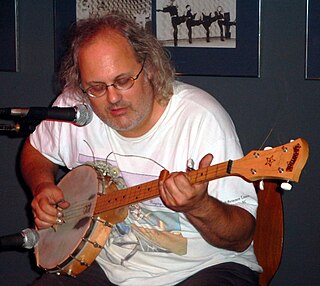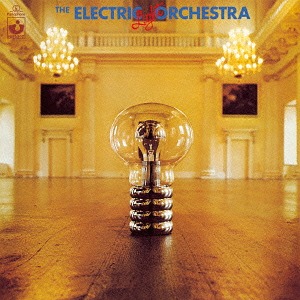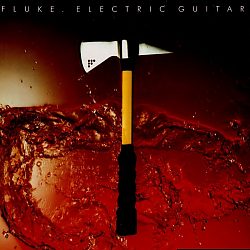
The Electric Light Orchestra (ELO) are an English rock band formed in Birmingham in 1970, by songwriters/multi-instrumentalists Jeff Lynne and Roy Wood with drummer Bev Bevan. Their music is characterised by a fusion of Beatlesque pop, classical arrangements, and futuristic iconography. After Wood's departure in 1972, Lynne became the band's leader, arranging and producing every album while writing virtually all of their original material. For their initial tenure, Lynne, Bevan and keyboardist Richard Tandy were the group's only consistent members.

Eugene Chadbourne is an American jazz guitarist and music critic.

A guitar solo is a melodic passage, instrumental section, or entire piece of music written for a classical guitar, electric guitar or an acoustic guitar. In the 20th and 21st century traditional music and popular music such as blues, swing, jazz, jazz fusion, rock and metal guitar solos often contain virtuoso techniques and varying degrees of improvisation. Guitar solos on classical guitar, which are typically written in musical notation, are also used in classical music forms such as chamber music and concertos.

The Beach Boys Today! is the eighth studio album by the American rock band the Beach Boys, released on March 8, 1965. The album signaled a departure from their previous records with its orchestral approach, intimate subject matter, and abandonment of themes related to surfing, cars, or superficial love. It peaked at number four on US record charts during a 50-week chart stay and was preceded by the top 10 singles "When I Grow Up " and "Dance, Dance, Dance", along with "Do You Wanna Dance?" which reached number 12. When issued in the UK one year later, Today! peaked at number six.

Michael Arthur Herrera is an American singer, songwriter and musician best known as the lead vocalist, bassist and songwriter for the punk rock band MxPx. He is also the frontman of Tumbledown and the bassist of Goldfinger.

The baritone guitar is a guitar with a longer scale length, typically a larger body, and heavier internal bracing, so it can be tuned to a lower pitch. Gretsch, Fender, Gibson, Ibanez, ESP Guitars, PRS Guitars, Music Man, Danelectro, Schecter, Jerry Jones Guitars, Burns London and many other companies have produced electric baritone guitars since the 1960s, although always in small numbers due to low popularity. Tacoma, Santa Cruz, Taylor, Martin, Alvarez Guitars and others have made acoustic baritone guitars.

English Settlement is the fifth studio album by the English band XTC, released on 12 February 1982, and their first double album. The album reached No. 5 on the UK Album Chart for an 11-week chart stay, and No. 48 on the Billboard 200 album chart for a 20-week stay.

"Have a Cigar" is the third track on Pink Floyd's 1975 album Wish You Were Here. It follows "Welcome to the Machine" and on the original LP opened side two. In some markets, the song was issued as a single. The song, written by Waters, is his own critique of the music industry at the time, and the hypocrisy of the band's record label to continue releasing more material.
Bering Strait was a country music band from Russia whose style was sometimes called "redgrass". In 2003, the band was nominated for a Grammy Award and appeared on the TV show 60 Minutes. The group disbanded in 2006. The lineup on their first album was Alexander Arzamastsev (drums), Natasha Borzilova, Sergey "Spooky" Olkhovsky, Sergei Passov, Lydia Salnikova, Sasha Ostrovsky and Ilya Toshinsky.

"Love Me Two Times" is a song by the American rock band the Doors. It first appeared on their second studio album Strange Days. It was edited to a 2:37 length and released as the second single from that album, and reached number 25 on the charts in the United States.

"Just" is a single by English alternative rock band Radiohead, released in 1995. It is the seventh track on their 1995 album The Bends. Radiohead frontman Thom Yorke wrote the song about a narcissistic friend of his, which on closer inspection is showcased by the imagery in the lyrics - a parallel to earlier My Iron Lung EP track "Lewis [Mistreated]". He also says that it was something of a competition between him and Jonny Greenwood to see who could fit the most chords into a song. In the UK, this single was available as two CDs: the first one featured different tracks, and the colour of the album art on the second single was inverted.

"Las Palabras de Amor " is a rock ballad by the British rock band Queen. It was released as the third single from their 1982 album Hot Space. It is sung mostly in English, but with several Spanish phrases. Written by guitarist Brian May, the song proved more popular in the United Kingdom than their previous single, reaching #17 in the UK Singles Chart.
"Sway" is a song by English rock band the Rolling Stones from their 1971 album Sticky Fingers. It was also released as the b-side of the "Wild Horses" single in June 1971. This single was released in the US only. Initial pressings of the single contain an alternate take; later pressings include the album version instead.

"Electric Eye" is a song by British heavy metal band Judas Priest, from their 1982 album Screaming for Vengeance, and released as a single later that year. It has become a staple at concerts, usually played as the first song.

The Electric Light Orchestra is the eponymous debut studio album by English rock band Electric Light Orchestra (ELO), released in December 1971 in the United Kingdom by Harvest Records. In the United States, the album was released in early 1972 as No Answer, after a misunderstood telephone message made by a United Artists Records executive asking about the album name; the caller, having failed to reach the ELO contact, wrote down "no answer" in his notes, and this was misconstrued to be the name of the album.

"Ride My See-Saw" is a hit 1968 single by the English progressive rock band The Moody Blues. It was written by the band's bassist John Lodge, and was first released on the Moody Blues' 1968 album In Search of the Lost Chord. It was the second of two singles from that album, the other being "Voices in the Sky". "Ride My See-Saw" is one of John Lodge's signature high-energy rock and roll songs, and is sometimes regarded as his most popular composition for the Moody Blues, along with "I'm Just a Singer ".

Capercaillie is a Scottish folk band that was founded in the 1980s by Donald Shaw and led by Karen Matheson. Capercaillie performs traditional Gaelic and contemporary English songs. The group adapts traditional Gaelic music and traditional lyrics with modern production techniques and instruments such as electric guitar and bass guitar, though rarely synthesizers or drum machines.

Electric Dreams is the sixth solo album by English jazz guitarist John McLaughlin and his "One Truth Band", released in 1979. Between his fourth and fifth solo albums he spent several years active with the Mahavishnu Orchestra.
"Hand of Doom" is a song by the English heavy metal band Black Sabbath, originally appearing as the sixth song on their second album Paranoid, released in 1970. It has been performed in many of Black Sabbath's live concerts. The lyrics were written by Geezer Butler while the music was written by the four members. "Hand of Doom" is accepted as one of the best songs on the album by many fans of Black Sabbath. It is the second longest song on the album behind "War Pigs".
The song was conceived after the band had observed a growing number of US soldiers arriving in England in the late 1960s from the Vietnam War with severe drug addictions. It is about them taking drugs to forget the atrocities of war, only to see it catch up on them and slowly destroy them from the inside.

Koza Mostra is a Greek rock band founded by Ilias Kozas in 2011. It consists of Ilias Kozas, Stelios Tsompanidis, Tasos Korkovelos, Dimitris Christonis, Tasos Gentzis and Petros Lagontzos. The band fuses ska, punk, and rock music together with the style of traditional greek folk music such as Macedonian Greek music and rebetiko. They are also known for performing in kilts or fustanella.



















